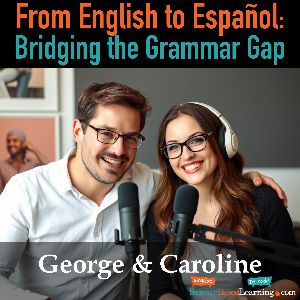Mastering Future Tense in Spanish with "Ir a" + Infinitive
January 14, 2025Categories: Spanish Language Learning, Lesson


From English to Español: Bridging the Grammar Gap with Alberto Rodriquez
Welcome to "From English to Español: Bridging the Grammar Gap", the podcast created specifically for English speakers ready to take their Spanish skills to the next level. Each episode dives into the core differences and surprising similarities between English and Spanish grammar, unraveling the complexities of the language in a way that’s clear, practical, and easy to follow. We'll break down essential concepts like verb conjugations, gendered nouns, and the tricky subjunctive mood, offering insights and tips that simplify these new rules and help you avoid common pitfalls. By comparing Spanish structures directly with English, you’ll quickly understand how to adapt what you already know into accurate, natural Spanish. Whether you’re a beginner or looking to brush up on advanced topics, this podcast is your comprehensive guide for bridging the gap between English and Spanish grammar, so you can speak and write with confidence. Join us daily for a new rule or concept, complete with practical examples, exercises, and memorable explanations that make learning Spanish engaging and enjoyable. Perfect for self-learners, students, and anyone serious about mastering Spanish grammar, "From English to Español" is your go-to resource for building fluency from the ground up.
When learning Spanish, one of the essential constructions you'll encounter is expressing the future tense using the phrase "ir a" followed by an infinitive verb. This structure is equivalent to the English "going to" form, and it is used frequently in everyday conversation to indicate an action that will occur in the near future.
The formula is straightforward:
Let's break it down with a simple example:
- Yo voy a estudiar. (I am going to study.)
In this sentence, "voy" is the first-person singular form of "ir" (to go), "a" is the preposition, and "estudiar" is the infinitive verb (to study).
Conjugation of "Ir"
To effectively use this construction, it is crucial to know the present tense conjugation of the verb "ir":
- Yo voy (I go)
- Tú vas (You go - informal)
- Él/Ella/Usted va (He/She/You go - formal)
- Nosotros/Nosotras vamos (We go)
- Vosotros/Vosotras vais (You all go - informal in Spain)
- Ellos/Ellas/Ustedes van (They/You all go - formal in Latin America)
By combining the correct form of "ir" with "a" and an infinitive, you can communicate future actions. For example:
- Ellos van a viajar a México. (They are going to travel to Mexico.)
- Nosotros vamos a comer. (We are going to eat.)
Exceptions and Nuances
While the "ir a" + infinitive construction is widely used, there are some nuances and exceptions to consider:
- Alternative Future Tense: Spanish also has a simple future tense, such as "hablaré" (I will speak). This form is more formal and often used in writing or to express a more distant future.
- Regional Variations: Depending on the region, the preference for using "ir a" + infinitive versus the simple future tense can vary. In some areas, especially in Latin America, the "ir a" form is more common in everyday speech.
- Imminence: The "ir a" construction often implies an action that is intended or planned, suggesting a sense of immediacy or certainty.
Consider these examples that highlight these nuances:
- Vamos a ver una película esta noche. (We are going to watch a movie tonight.) - Implies a planned activity.
- Veremos una película. (We will watch a movie.) - This could imply a more formal or less immediate future.
Understanding these subtleties will enhance your fluency in Spanish and enable you to express future intentions with greater accuracy.
For more insights into learning Spanish and mastering its grammar, visit ScienceBasedLearning.com. To dive deeper, consider getting your copy of our comprehensive guide to Spanish grammar and vocabulary. Get Your Copy today!